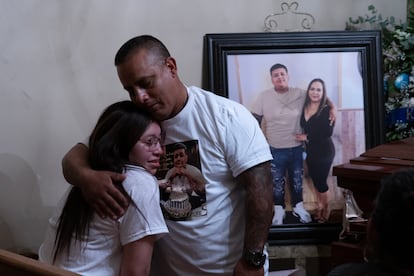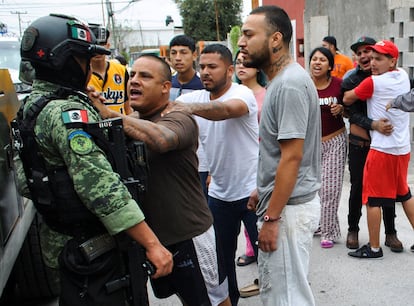A survivor of the Nuevo Laredo massacre: ‘I heard the soldiers shout ‘Kill him, kill him!’
Documents seen by EL PAÍS, a military report and the testimony of a survivor shed light on the shooting deaths of five unarmed young men in the Mexican border city in late February


“When I got out of the truck, I heard the soldiers shout: ‘Kill him, kill him!’’ They put me face down. Then I heard two more shots, and after a while I saw my brother lying on the ground.” This is part of the witness account of Alejandro Pérez, 21, a survivor of the Nuevo Laredo massacre. In late February, five young men died at the hands of Mexican military personnel in the border city, among them Pérez’s brother. Another survivor ended up in an induced coma in hospital. Pérez still does not know why he was spared.
Pérez explains that he and his friends went to a nightclub in town on Saturday, February 25, and that, on their way back in a pick-up truck, a military convoy began to chase them. He says that one of the military vehicles rammed theirs from behind and that the soldiers began to shoot immediately. He says that he had his friends were all unarmed. After the initial shots were fired, the soldiers approached on foot. “I caught a glimpse of a soldier shooting a friend who was already wounded. He was asking for an ambulance, but the soldier shot him again.”
Pérez’s testimony, to which EL PAÍS has had access, also reflect the intimidation the soldiers subjected him to: “They asked me if I wanted to live or die and I answered that I wanted to live. And they told me to plead guilty, while they videotaped me, to say that we were running away, which is not true.” According to Pérez, he eventually agreed. A soldier recorded his words on a cell phone.
Pérez’s testimony, collected in several statements given to the authorities and human rights organizations, shed light on an event that caused outrage in Tamaulipas, one of the most violent states in Mexico, where violent clashes between military personnel and civilians are more prevalent than anywhere in the country. On Sunday February 26, relatives and neighbors of the five young men who were killed confronted the military with kicks and punches at the scene of the event.
When the Defense Ministry finally offered its version of events in a brief statement released to the media two days later, it was a very different version from Pérez’s, although the authorities acknowledged the soldiers shot at the youths. The ministry did not mention any provocation on the part of Pérez and his friends, nor did the official statement mention the discovery of any weapons in their vehicle. “Military personnel were conducting a patrol when they heard gunshots. They advanced in the direction from which where these were heard,” the statement read. “Subsequently they saw a pick-up type vehicle with seven individuals on board, traveling at excessive speed, with its lights off and without license plates [...] They accelerated and hit a parked vehicle. Upon hearing the noise, military personnel fired their weapons.”
The following day, President Andrés Manuel López Obrador referred to the matter in his morning press conference, saying that he and his cabinet and had been made aware of the case and had asked the National Human Rights Commission to investigate, adding that the military authorities would cooperate and if the deaths were proven to be unlawful, those responsible “will be punished.”
On March 20, EL PAÍS learned that four of the soldiers involved in the shooting were in detention at a military base in Mexico City. They are named as Agustín Cornelio N., Juan Carlos N., Bernardo N. and Jorge Nicolás N., all non-commissioned officers in the 16th Motorized Cavalry Regiment. If found guilty of killing the five unarmed young men, they could face prison sentences of between 30 and 60 years.

A report prepared by the military after the shootings, to which this newspaper has had access, provides details that the Defense Ministry statement omitted. In some cases, the two reports are contradictory. Its signatory, Cavalry Captain Elio N., mentions, for example, that he and his men also heard gunshots after the initial clash, not just at the beginning when the soldiers were in pursuit. In addition, the captain does not state in his report that the vehicle had no license plates or that it was driving with its headlights off.
The captain’s report also mentions that the youths’ pick-up truck, after crashing, still continued for a block until it came to a complete stop. It was then that two of the four military vehicles involved were paired up, he explains, and when gunshots were heard again. “At that moment,” the captain’s report read, “I heard several weapons being fired without my giving such an order, so I immediately ordered a cease fire via radio.” The captain asked who had fired. “Voluntarily,” he says, four cavalry corporals acknowledged having pulled the trigger.
The captain’s unit then conducted an inspection and realized that there were two lifeless young men on the sidewalk and three others inside the truck. In the back, behind the driver, was Pérez. “Nothing illicit was found inside the vehicle,” said the officer’s report, which contrasts here again with that of Pérez: the captain does not mention him at all, only the ambulance that arrived to take the wounded man away.

Grief and anger in Nuevo Laredo
Enrique Pérez, the father of Gustavo Pérez, Alejandro’s brother, remembers that weekend well: “I was in Laredo, Texas, on Saturday at a barbecue. The boys spoke to me and told me they were going for a ride. I told them to be careful,” he says. When he returned to Mexico the following day, he heard there had been a shooting. “I didn’t believe it, I hadn’t heard anything.”
Pérez and his wife decided to call Alejandro. “We are all friends on the block and sometimes they hang out and stay out until dawn,” he explains. When he answered the phone, Alejandro told his father: “They killed my brother, they killed him!” Enrique Pérez ran to the scene and immediately saw the young man there, next to an agent from the Prosecutor General’s Office. “What happened?” he asked his son. “The soldiers were all over us,” he says the boy answered.
After the shootings there was a lot of talk about what the young men had got up to, beyond the night of the events. Photographs and videos circulated on social media of at least one of them, Wilberto Mata, posing with weapons, tactical equipment and vehicles belonging to an alleged criminal group. Asked about this, Pérez answers for his sons. “They fix box trailers and diesel trucks. They want to get a trucker’s license to do the transfer like me,” he explains, referring to the truckers who deliver goods across the US-Mexico border.
Humberto Suárez, 48, is the picture of the pain in Nuevo Laredo. In a video that began circulating after the shootings, he appears holding a viscous substance, with a blank stare. It is a part of his son’s body. “What I want is justice,” he says now. “The military is supposed to be trained for this and they didn’t even find anything on them.”
Suárez says that his son was the one driving the truck. “He was born in San Antonio and lived there. He worked in a landscaping company, cutting grass. He was very enterprising; he was always doing this and that. He had just bought some inflatable castles to rent for children’s parties,” he says. Gustavo Suárez was 21 and split his time between San Antonio and Nuevo Laredo. His father explains that Gustavo’s partner, who lives in Nuevo Laredo, had just become pregnant: he pulls out his cell phone and shows a photo with three positive pregnancy tests.
“On Saturday he called me and asked me if I could give him a fish,” explains Humberto, who likes to go fishing for catfish in the waters of the Rio Bravo. “I said yes and he said ‘you know what, you’re going to be a grandfather.’ He was really crazy,” he laughs at the memory. The young man’s plan was to grill the fish to celebrate the pregnancy, but that all changed when the group of friends decided to go out instead, little knowing they would not make it back.
Sign up for our weekly newsletter to get more English-language news coverage from EL PAÍS USA Edition
Tu suscripción se está usando en otro dispositivo
¿Quieres añadir otro usuario a tu suscripción?
Si continúas leyendo en este dispositivo, no se podrá leer en el otro.
FlechaTu suscripción se está usando en otro dispositivo y solo puedes acceder a EL PAÍS desde un dispositivo a la vez.
Si quieres compartir tu cuenta, cambia tu suscripción a la modalidad Premium, así podrás añadir otro usuario. Cada uno accederá con su propia cuenta de email, lo que os permitirá personalizar vuestra experiencia en EL PAÍS.
¿Tienes una suscripción de empresa? Accede aquí para contratar más cuentas.
En el caso de no saber quién está usando tu cuenta, te recomendamos cambiar tu contraseña aquí.
Si decides continuar compartiendo tu cuenta, este mensaje se mostrará en tu dispositivo y en el de la otra persona que está usando tu cuenta de forma indefinida, afectando a tu experiencia de lectura. Puedes consultar aquí los términos y condiciones de la suscripción digital.








































